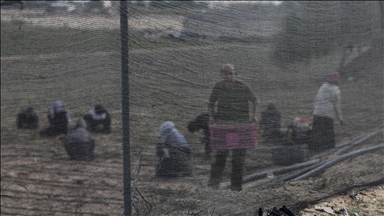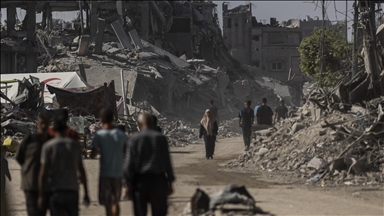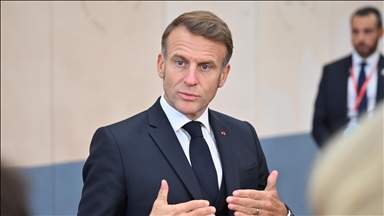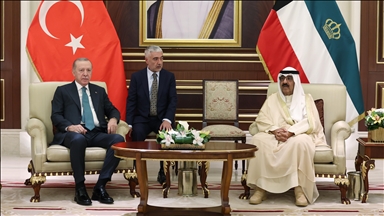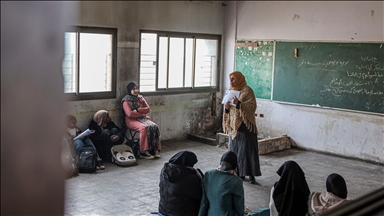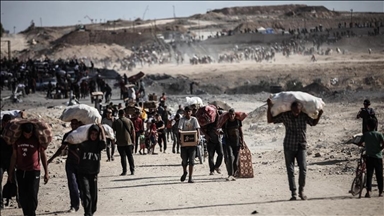INTERVIEW – ‘We are going to Gaza’: Aid flotilla organizer rejects Israeli threats to halt voyage
Nabil al-Shannoufi says activists aboard Gaza aid flotilla remain determined to break Israeli blockade
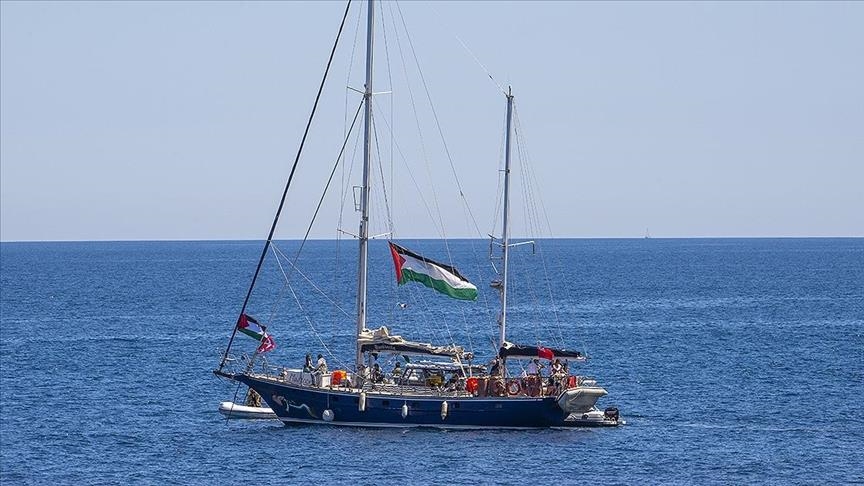
TUNIS, Tunisia / ISTANBUL
An international aid flotilla is approaching the shores of the blockaded Gaza Strip and will not accept Israeli threats to halt its voyage, an organizer said Tuesday.
Nabil al-Shannoufi, a member of the Maghreb branch of the Global Sumud Flotilla, told Anadolu aboard the ship Deir Yassin that participants are determined to reach the enclave despite Israeli threats.
Israel’s public broadcaster KAN said Tuesday that the military is preparing to intercept the convoy and tow the vessels to Ashdod Port in southern Israel.
Shannoufi said the morale of activists aboard the flotilla is rising as ships near the “red zones” where Israeli forces typically intercept vessels.
He noted that three warships were accompanying the flotilla – one Greek and two believed to be Spanish and Italian.
Spanish Prime Minister Pedro Sanchez announced Thursday that Spain would deploy a warship from Cartagena in southeastern Spain to help protect the flotilla.
Diplomatic challenge
Shannoufi said Israel is expected to prepare for “the largest humanitarian flotilla in modern history,” both in the number of ships and activists on board.
He called the mission “a strategic threat to Israel greater than rockets,” describing it as a diplomatic challenge that could deepen Israel’s global isolation.
Israeli reactions began “even before we reached Greece,” including attempted attacks on the ships, Shannoufi said.
When those efforts failed, he said, Israel “stepped back to reconsider scenarios,” including waiting for the flotilla in Gaza’s territorial waters.
Last week, the flotilla reported that nine of its ships were attacked by drone strikes, causing material damage to several vessels. The flotilla did not disclose the timing or the party behind, while Israel, which has repeatedly threatened to block the convoy, remained silent.
Shannoufi ruled out a large-scale Israeli assault on the flotilla because of the presence of accompanying warships from some European countries. He acknowledged that these ships may not provide direct protection but said any Israeli attack could trigger a diplomatic crisis, particularly with Spain.
He said the warships are expected to escort the flotilla only up to 12 nautical miles from Gaza’s waters, after which “we’ll be on our own.”
“Israel can do what it wants,” he said, insisting the fleet will continue its course.
“Reaching Gaza is inevitable. We’re prepared for every scenario,” he told Anadolu.
Breaking Israeli siege
Shannoufi said Israel has proposed unloading aid at the Ashdod Port in Ashkelon in exchange for halting the voyage.
“We don’t trust Israel or its policies,” he said. “If they were serious, the Rafah border crossing would have been opened and aid trucks allowed in. This flotilla is not only about delivering aid but also about breaking the blockade. That’s why their proposal is completely unacceptable.”
He outlined three messages from the flotilla. The first, to global audiences, is that grassroots mobilization is more powerful than the ships themselves.
“Popular pressure worldwide can put far more pressure on Israel,” he said.
“The US should realize that global public opinion is gradually uniting against it,” he added. “It can either stop supporting Israel or face isolation and fragmentation, which could even lead to civil strife.”
His second message was directed to the Arab and Muslim public. “We see Western societies protesting more actively. Yes, political circumstances in Arab countries are difficult, but that doesn’t justify inaction,” he said. He called for broad boycotts, arguing that the collective power of 450 million Arabs and two billion Muslims could “change the equation.”
“We must not be like powerless crowds,” he said. “We should use every tool of pressure we have. Palestine is home to Al-Aqsa Mosque, a cause that commands deep reverence.”
Embracing Gazans
His third message was to Gazans, who, he said, have sent waves of messages through social media expressing excitement.
“They know we don’t carry massive amounts of aid,” he said. “What they await is the breaking of the blockade and the embrace of people from around the world after years of isolation. We long to see and hug you. We are with you and won’t abandon Gaza again,” he said.
Dozens of ships carrying humanitarian aid, including medical supplies, have been sailing toward Gaza for several days in a rare coordinated effort. This is the first time in nearly 18 years of blockade that such a large fleet has approached the enclave, home to about 2.4 million Palestinians.
Israel tightened the siege further on March 2 by closing all border crossings and blocking food, medicine and aid, pushing Gaza into famine despite aid trucks piling up at its borders.
The Israeli army has killed over 66,000 Palestinians, most of them women and children, in Gaza since October 2023. The relentless bombardment has rendered the enclave uninhabitable and led to starvation and the spread of diseases.
Anadolu Agency website contains only a portion of the news stories offered to subscribers in the AA News Broadcasting System (HAS), and in summarized form. Please contact us for subscription options.


